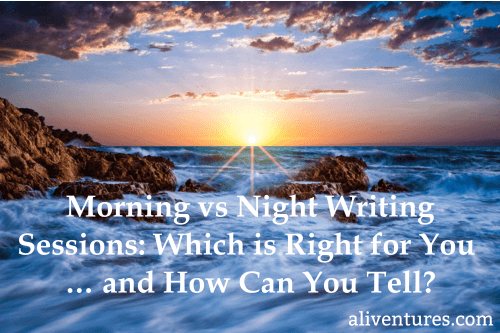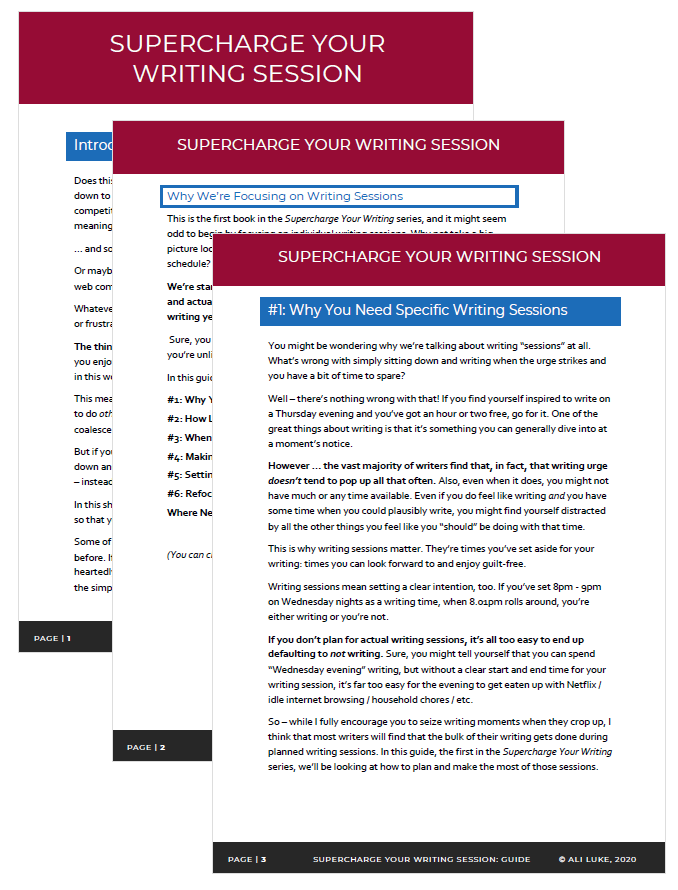Morning vs Night Writing Sessions: Which is Right for You … and How Can You Tell?

Previously, I’ve covered finding the best time of day to write … but for many writers, the choice comes down to two prime slots: first thing in the morning or last thing at night.
Unless you work shifts, your working hours likely fall somewhere in the 8am–6pm range. And regular commitments that involve other people don’t generally happen before breakfast or late in the evening. If you have young children, they’re likely sleeping more hours than you … meaning you probably have some time at the start and/or end of your day while they’re asleep.
There’s a good chance, then, that writing very early or very late will fit into your day. You might be able to write from 6am–7am without interruptions, or from 10pm–11pm, whereas 3pm–4pm could be impossible, even if you’re feeling at your most creative mid-afternoon.
So should you opt for morning or night writing sessions? Both have advantages, and while you might already have a gut feeling that one is better than the other for you, it’s worth thinking this through and experimenting a little.
Why Write in the Morning?
Writing in the morning gets a good press – and it definitely has lots of advantages. If you get up and write at the very start of your day, that means:
- However busy or chaotic the rest of your day is, you’ve got your writing done. There’s only so much scope for things to go wrong before 6am.
- You get the satisfaction of making real progress at the start of your day, potentially putting you in a great frame of mind to tackle other goals.
- For some people (not all), you’ll be feeling mentally fresh and focused first thing. Other demands of the day haven’t yet crowded in.
- Unless everyone else in your house is an early riser too, you can likely get your writing time in uninterrupted.
Some writers like to get up seriously early to write:
I tend to wake up very early. Too early. Four o’clock is standard. My morning begins with trying not to get up before the sun rises. But when I do, it’s because my head is too full of words, and I just need to get to my desk and start dumping them into a file. I always wake with sentences pouring into my head.
– Barbara Kingsolver, in an interview here
When I am working on a book or a story I write every morning as soon after first light as possible. There is no one to disturb you and it is cool or cold and you come to your work and warm as you write.
– Ernest Hemingway, quoted here
Why Write at Night?
Writing late in the evening, once the day is done, can also have a lot of advantages. If you stay up and write once the house is quiet(er), that means:
- You can relax into your writing, knowing that your day is done, and you don’t need to tackle any more tasks afterwards.
- Even if you had a hectic day full of unexpected mini-disasters, finishing with even a short writing session can leave you feeling that your day wasn’t wasted, after all.
- For some people (not all), the night can be a wonderful time to feel creative and inspired. Perhaps ideas have been simmering away during the day and you’re ready to get them down on paper.
- Other people in your house are likely either asleep or unwinding (e.g. watching TV) – hopefully meaning fewer interruptions.
Some writers find the night a wonderful time to be creative:
At night, when the objective world has slunk back into its cavern and left dreamers to their own, there come inspirations and capabilities impossible at any less magical and quiet hour. No one knows whether or not he is a writer unless he has tried writing at night.
– H.P. Lovecraft, quoted here
Mostly, though, I stay up to write. I started doing so in earnest in college, when almost everyone stays up to write—to the dismay of the remaining few, a.k.a. the roommates. Half my memories of those years are bathed in the blue glow of a computer, illuminating an otherwise dark room. […] I believe I was supposed to outgrow that habit. Instead, I grew into it. Left to my own devices, I write best from ten at night to 4 a.m.
– Kathryn Schulz, from this article
Which is Right for You? (Hint: It’s Not Set in Stone)
Personally, I lean towards writing first thing in the morning when I can. It definitely feels like the right fit for me. But … I don’t think it’s the right fit for everyone, and it’s not been right for me at every stage of life, either.
The time of day that suits you best is going to depend on a range of factors, both internal and external. These include:
- Your personal preferences. Some people love to get up early and get started on the day: that’s how I’ve been all my life! Others prefer a relaxed wake-up and love to relax into being creative in the evening. Neither is “right” or “wrong” … it’s just a matter of which you prefer.
- Your energy levels. Some of us have lots of energy in the morning. Others find ourselves at our most creatively energetic late at night. Working with your natural energy cycles, rather than against them, can make it so much easier to enjoy writing.
- Your daily schedule. If your workday starts at 7am, you may not have time to write in the morning. If you have meetings several evenings each week, you may feel too tired to write after you get home.
- Your likelihood of being interrupted. When my kids were little, I was more likely to get interrupted in the morning, as they often woke up early. Now they’re bigger (10 and 8), evenings are more interruption-prone, as they’re not in bed long before me! Which option lets you best protect your writing time?
If you don’t already have a good idea of whether morning vs night is likely to be best for you and your circumstances, I’d encourage you to try out both! Have a go at writing in the mornings for a week or two. Does it seem like the right option for you? If you’re not sure, try evening writing instead: does that work better?
How Can You Tell if Morning vs Night Writing is Working for You?
So you’ve been writing in the mornings – or at night – and you’re not sure if it’s a good fit or not. Here are a few signs that it might be time to shake up your writing routine.
It’s Always an Uphill Battle
Most of us have some reluctance to sit down and actually put words on the page … but if you feel like it’s a huge struggle to talk yourself into it each writing session, maybe experiment with writing at the other end of the day.
You’re Sacrificing Things That Really Matter
If you’re writing first thing in the morning but that means missing out on sleep, or you’re writing late in the evening but that’s the time when your teens are at home after sports clubs and want to hang out, try something different. You don’t want to sacrifice sleep, health, time with family, or anything that’s really important to you.
You’ve Been Doing The Same Thing for Years
Maybe you’ve always written in the morning and it’s strange to even consider changing … but if you’ve never experimented with writing at night instead, why not give it a go? You may find something that worked for you five or ten years ago is no longer such a good fit.
Whether you write first thing in the morning, last thing at night, or somewhere in between, what matters is that you’re making time to write and you’re getting the most from that time.
Supercharge Your Writing Session ($8)

If you’d like some help in making time and making the most of it, my downloadable guide Supercharge Your Writing Session is for you. It’s designed to give you support in deciding when to write, how long to write for, how to set yourself up to focus, and what to do if you find yourself getting distracted.
Along with the guide itself, you get three bonus printables to help you establish a writing routine, set goals for your writing sessions, and “jump start” your writing when you hit a roadblock.
Click here for all the details about Supercharge Your Writing Session. It’s just $8, or you can buy all four guides in the series for $20 (making them $5 each).
About

I’m Ali Luke, and I live in Leeds in the UK with my husband and two children.
Aliventures is where I help you master the art, craft and business of writing.
Start Here
If you're new, welcome! These posts are good ones to start with:
Can You Call Yourself a “Writer” if You’re Not Currently Writing?
The Three Stages of Editing (and Nine Handy Do-it-Yourself Tips)
My Novels

My contemporary fantasy trilogy is available from Amazon. The books follow on from one another, so read Lycopolis first.
You can buy them all from Amazon, or read them FREE in Kindle Unlimited.


0 Comments